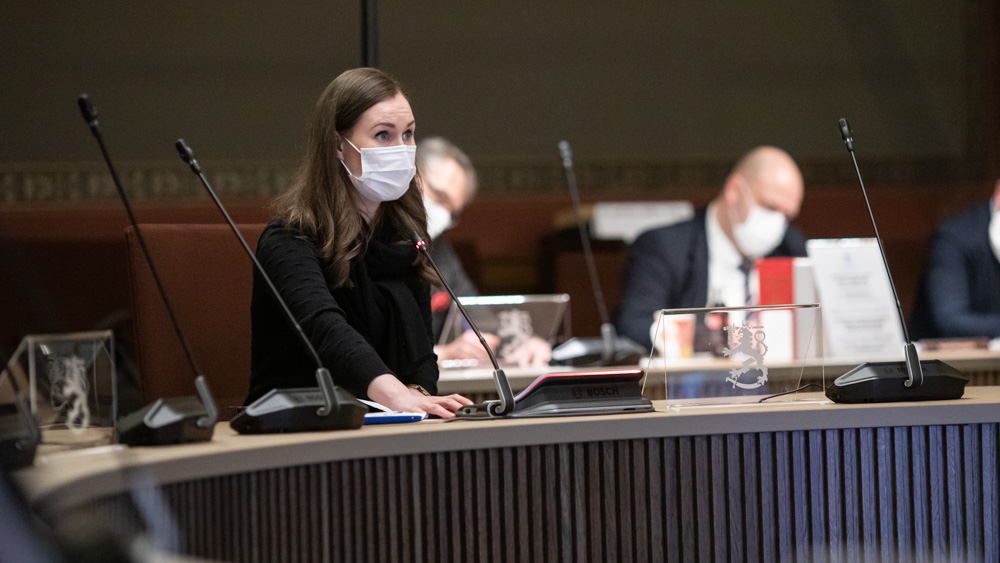Government discusses scenarios examining the social and economic impacts of the COVID-19 epidemic

In its talks on 9 December, the Government discussed different scenarios concerning the development of the COVID-19 epidemic. The three scenarios drawn up for use by the Government examine possible paths of development of the epidemic and their economic and social impacts. The timeline of the scenarios extends from December 2020 until the end of June 2021.
In its talks on 9 December, the Government discussed different scenarios concerning the development of the COVID-19 epidemic. The three scenarios drawn up for use by the Government examine possible paths of development of the epidemic and their economic and social impacts. The timeline of the scenarios extends from December 2020 until the end of June 2021.
The scenarios were drawn up by the Prime Minister’s Office, the Ministry of Social Affairs and Health, the Ministry of Finance and the Finnish Institute for Health and Welfare. The level of analysis is strategic and the memorandum does not discuss measures in detail.
The three scenarios are the following:
- Strong enough restrictions reintroduced as needed
- Restrictions slow down but do not stop the spread of the epidemic
- Limited impact of restrictions means more stringent measures needed later
In the first scenario, sufficiently strong restrictive measure bring the incidence of COVID-19 cases down to such a low level that they do not place a significant burden on the healthcare system. The restrictions need to be in place for an estimated 3–4 weeks. The Government is prepared to tighten the restrictions again as needed.
In the second scenario, the restrictive measures in force are able to slow down the course of the epidemic. However, the epidemic continues to accelerate gradually, and more extensive and stringent restrictions than the original measures are needed to keep it under control.
In the third scenario, the impact of the restrictive measures is initially limited, and the epidemic continues to accelerate rapidly and vigorously. As a result, the Government is forced to implement extensive and significant restrictive measures at a later stage.
Swift and decisive action will produce the most favourable outcome
The scenarios and the resulting models and assessments of the economic, health and social impacts indicate that rapid and decisive action to curb the epidemic will lead to the most favourable outcome. The outcome is particularly harmful in a scenario where restrictive measures are postponed for too long, leading the epidemic to get out of hand and forcing the Government to implement extensive restrictions in order to restore control.
The effects of the different scenarios are similar for all aspects of the analysis: the capacity of and burden on the healthcare system, the development of gross domestic product and employment, and the broader impact on healthcare and social welfare services.
The effects of uncertainty related to the development of the epidemic are similar in all scenarios. This is a key factor not only when it comes to the stress experienced by the population, but also from the perspective of business and industry. The greater the uncertainty surrounding the epidemic, the more it undermines people’s confidence in the future and, consequently, the level of economic activity.
One particularly significant conclusion is that, based on the calculations, the development of the epidemic and the resulting burden on the healthcare system have a greater impact on economic development than the restrictions imposed in order to manage the epidemic.
The scenarios examined here are not forecasts, but rather alternative paths of development of the epidemic based on modelling and calculations. All three scenarios involve significant uncertainty when it comes to factors such as the behaviour of the population as the epidemic continues.
Inquiries: Jouni Varanka, Ministerial Adviser, Prime Minister’s Office, tel. +358 50 592 0606, Mika Salminen, Director, Finnish Institute for Health and Welfare, [email protected], Liisa-Maria Voipio-Pulkki, Strategic Director, Pasi Pohjola, Director, [email protected], Ministry of Social Affairs and Health, [email protected], Mikko Spolander, Director General, Ministry of Finance, tel. +358 2955 30006.